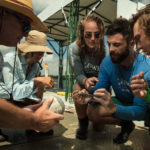UWF engages local high school students in environmental health summer experience
The University of West Florida Master of Public Health program is participating in the recently created Emerging Scholars in Environmental Health initiative through a subcontract with Tulane University totaling $120,000 per year for the next four years.
This academic enrichment program targets secondary school students and teachers from regional schools who are chosen to participate in an eight-week summer camp focusing on topics in environmental health, such as solid and hazardous waste, water and wastewater, air quality, food safety, global health and more. Students participate in two days of classroom activities and a weekly field trip, and teachers take part in a two-day workshop and tours of environmental health sites. Nine students from Pensacola High School, West Florida High School and Tate High School participated in the program this summer.
“This project has provided a group of exceptional, highly motivated and enthusiastic secondary education students with a unique opportunity to gain content and hands-on experience in the field of environmental health,” said Dr. George Stewart, chair of UWF’s School of Allied Health and Life Sciences. “It has been an exciting and enlightening experience for the secondary education teachers, preparing them to transition what they have learned into the classroom setting at their schools. This program has raised awareness among the participants on environmental issues we face as a society, is educating them as present and future voters for making informed decisions on critical issues that will impact our planet, and is attracting talented young people into the field of environmental health.”
The students have participated in field trips to the Escambia County Landfill to see how municipal solid waste is handled and the Central Reclamation Facility to tour Escambia County’s state-of-the-art, advanced wastewater treatment facility, which has gained national recognition. Remaining field trips include a tour of the Escambia County Emergency Operations Center to learn more about how emergencies are handled and more.
Additionally, local industry experts from the Florida Department of Health, Gulf Coast Energy Network, Santa Rosa County Emergency Preparedness spoke to students during class to discuss their perspectives and experience in environmental health.
As part of the program, students conducted water-testing experiments and will complete a case study in environmental health, featuring a poster presentation that will be presented to local experts.
The UWF Emerging Scholars in Environmental Health initiative is part of the Gulf Region Health Outreach Program’s Environmental Health Capacity and Literacy Project, led by the Center for Gulf Coast Environmental Health Research, Leadership, and Strategic Initiatives at Tulane University. For additional information, visit www.


